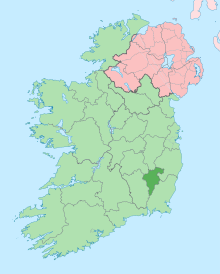

The Irish pork crisis of 2008 was a dioxin contamination incident in Ireland that led to an international recall of pork products from Ireland produced between September and early December of that year.[1] It was disclosed in early December 2008 that contaminated animal feed supplied by one Irish manufacturer to thirty-seven beef farms and nine pig farms across Republic of Ireland, and eight beef farms and one dairy farm in Northern Ireland, had caused the contamination of pork with between 80 and 200 times the EU's recommended limit for dioxins and dioxin-like PCBs i.e. 0.2 ng/g TEQ fat (0.2 ppb).[2] The Food Safety Authority of Ireland moved on 6 December to recall from the market all Irish pork products dating from 1 September 2008 to that date. The contaminated feed that was supplied to forty-five beef farms across the island was judged to have caused no significant public health risk, accordingly no recall of beef was ordered.[3] Also affected was a dairy farm in Northern Ireland; some milk supplies were withdrawn from circulation. Processors refused to resume slaughter of pigs until they received financial compensation.
Pork supplies to a total of twenty-three countries was affected, thirteen within the European Union and the remainder outside in an area across at least three continents. Countries affected include: Italy, Germany, the Netherlands, Poland, Sweden, Denmark, Belgium, Estonia, the UK, France, Portugal, Cyprus, Romania, Russia, the United States, Canada, Switzerland, China, South Korea, Japan and Republic of Singapore.
It is now suspected that the oil that contaminated the offending pig feed with dioxins came from County Tyrone.[4] Some reports suggest the recovery of the Irish pork market would take up to a decade.[5] The Irish government has been criticised over its handling of the incident.[6]
On 18 December 2008, it was disclosed that the beef samples from the affected farms had dioxin levels between 100 and 400 times the legal limit.[7] However the Irish authorities insisted that the threat to public health from Irish beef products, even though the dioxin levels were higher than in the affected pork, was insignificant.[7][8] On 25 January 2009, Chinese quarantine authorities seized over 23 tonnes of frozen and contaminated Irish pork which was imported by a company in the city of Suzhou in October 2008.[9] On 28 January 2009, Joint Oireachtas Committee on Agriculture was told by Indaver Ireland managing director John Ahern that Ireland could "sleepwalk" into another pork crisis if the Minister for the Environment, John Gormley, continued with his plans to commence widespread use of mechanical biological treatment.[10]
- ^ "Ireland warns public not to eat Irish pork". AOL Australia. 7 December 2008. Archived from the original on 14 December 2008. Retrieved 6 December 2008.
- ^ Cite error: The named reference
EFSA PDFwas invoked but never defined (see the help page). - ^ "Farmers urge consumers to continue buying beef – The Irish Times – Tue, Dec 09, 2008". Irishtimes.com. 12 December 2008. Retrieved 12 December 2008.
- ^ McKee, Linda (10 December 2008). "Tyrone link to pork crisis". Belfasttelegraph.co.uk. The Belfast Telegraph. Archived from the original on 12 December 2008. Retrieved 10 December 2008.
- ^ "Drive starts to win back markets for Irish pork". The Irish Times. 12 December 2008. Archived from the original on 21 May 2011. Retrieved 12 December 2008.
- ^ "Frontline listeners put the pork crisis in perspective". Evening Herald. 12 December 2008. Archived from the original on 11 January 2009. Retrieved 15 December 2008.
- ^ a b "Irish find high dioxin levels in beef, but no risk". Associated Press/Google. Retrieved 19 December 2008.
- ^ "Beef from 21 farms withdrawn after tests for dioxins". The Irish Times. Archived from the original on 21 May 2011. Retrieved 21 December 2008.
- ^ "China seizes tainted Irish pork". RTÉ. 25 January 2009. Archived from the original on 3 February 2009. Retrieved 25 January 2009.
- ^ "Ireland could 'sleepwalk' into food crisis". RTÉ. 28 January 2009. Archived from the original on 31 January 2009. Retrieved 4 February 2009.
© MMXXIII Rich X Search. We shall prevail. All rights reserved. Rich X Search
